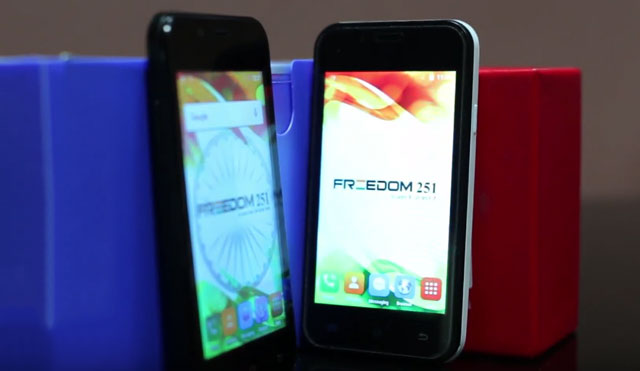
In the next few weeks, the world’s cheapest smartphone will meet the world’s fastest growing smartphone market. In theory, at least.
A little-known Indian company called Ringing Bells Pvt is set to start shipping the Freedom 251. The prototype touts a quad-core processor, a 4-inch screen and front and back cameras — at the astonishingly low price of 251 rupees (less than US$4, or R60).
While global brands Samsung Electronics and Lenovo Group sell devices for less than $100, the $4 smartphone is the one stirring up the Internet-hungry, app-crazy hordes in a country where Apple has been unable to make a dent. With iPhones costing upwards of $700, Apple commands a mere 2% market share in a country where the World Bank puts the per capita income at $5 630.
Brands can’t make money even on $50 smartphones, so profiting from a $4 device is a ludicrous idea, say experts like Tarun Pathak, a senior analyst at Counterpoint Technology Market Research. While Micromax sells millions of cheap devices every month in smaller cities, it profits by taking advantage of economies of scale.
Ringing Bells MD Mohit Goel isn’t counting on a profit from device sales, conceding that the company will lose hundreds of rupees on each unit, and is instead planning to recoup money through advertising and marketing deals. Goel has said the company is importing kits from Taiwan and assembling the phones in a factory in Haridwar near Delhi.
While India has the world’s second largest smartphone base with 222m users according to Forrester Research, that’s only 17% of the population. The real prize is the hundreds of millions of potential buyers as the base is expected to grow to 517m by 2021, with the market for sub-$150 smartphones forecast to grow at 44% rates this year, according to a CMR report.
Even at $4, the smartphone could still be out of reach for most because of scarcity. When Goel first announced Freedom 251 in February, the company said over 70m jostled to register, crashing its website. Last week he said Ringing Bells will soon start shipping 200 000 smartphones to buyers picked by lottery. Other details were not available and e-mails, phone calls and text messages to Goel and his representatives in the past days went unanswered.
Selling such a cheap device has attracted scrutiny along with the publicity. The prototype Freedom 251 presented to the media turned out to be produced by another manufacturer with its logos covered. Thwarted buyers protested outside the company’s headquarters, setting off inquiries by the police and tax officials.
Pankaj Mahindroo, president of the Indian Cellular Association, with members including Apple and Samsung, said “We are concerned and keeping a close watch.”
Goel, who doesn’t have a technology background, denied allegations that the company was misleading customers as Ringing Bells refunded deposits and delayed the launch date.
A la carte production means just about anyone, not just household technology names, can get into the smartphone business by heading to China and ordering direct with factory owners for budget devices, said Satish Meena, a New Delhi-based analyst at Forrester. It’s become such a commodity that even “a cement maker can get into making smartphones overnight”, he said.
Still, the price of the Freedom 251 is far below what anyone else has promised.
“A $4 smartphone is nothing but a gimmick,” said Meena. — (c) 2016 Bloomberg LP

